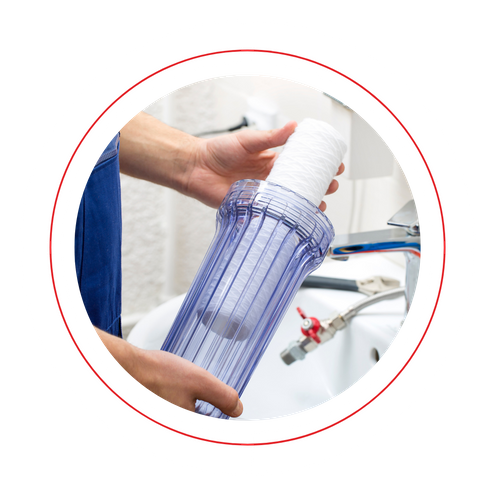Water is important for all living things, and it's crucial to make sure it's clean for our health. Due to rising pollution, it is crucial to monitor and preserve the quality of our water. This article talks about the importance of water quality and different filtration methods that can make it better.

Water Quality and Water Filtration - Bixby Plumbers
Caitie Brown
The Importance of Water Quality
Water quality refers to the chemical, physical, and biological characteristics of water. These characteristics can affect its suitability for different purposes, such as drinking, agriculture, and recreation.
Poor water quality can lead to various health issues, including gastro illnesses, skin infections, and even neurological disorders. It can also harm aquatic life and disrupt the ecosystem. Therefore, it is essential to regularly test and monitor the quality of our water sources. Please check with you local water sources and the CDC for more informatio.

Water Quality Testing - Tulsa Plumbers
1. Source and Supply:Tulsa's water supply primarily comes from local lakes. The city's water treatment facilities play a crucial role in ensuring the water meets regulatory standards before distribution.
2. Water Treatment Process:
In Tulsa, water is treated using coagulation, filtration, and disinfection to make it safe for consumption. We implement stringent measures to remove impurities and contaminants.
3. Water Quality Standards:
Tulsa adheres to federal and state water quality standards established by agencies like the Environmental Protection Agency (EPA) and state environmental departments. These standards encompass parameters such as microbial contaminants, disinfection byproducts, heavy metals, and other pollutants.
4. Monitoring and Testing:
Regular monitoring and testing of water quality are conducted at various points in the distribution system. This involves routine sampling and analysis to ensure compliance with established standards.
5. Public Reporting:
The results of water quality tests are typically made available to the public through annual water quality reports. These reports show the amount of harmful substances in the water and tell us if it is safe to drink.
6. Challenges and Mitigation:
Tulsa may face specific challenges related to water quality, such as [identify any local challenges, such as industrial discharges or agricultural runoff]. Efforts and initiatives to address these challenges are crucial for maintaining and improving water quality.
7. Community Engagement:
Public awareness and community engagement play a vital role in water quality management. Tulsa likely encourages citizens to report any concerns about water quality and actively communicates initiatives to safeguard water resources.
8. Future Initiatives:
Spot On Plumbing of Tulsa Plumbers helps improve water quality through upgrades, pollution prevention, and advanced treatment technologies.
For the most current and accurate information, consult local water authorities, environmental agencies, or recent Tulsa water quality reports.
How to read a water quality test:
Reading a water quality test involves interpreting the results of various parameters measured in the water sample. The specific parameters tested can vary depending on the testing method and the goals of the analysis. Here are common water quality parameters and how to interpret their results:
pH:
Normal Range: Typically, the pH of water should be between 6.5 and 8.5.
Interpretation: Values below 6.5 may indicate acidity, while values above 8.5 may indicate alkalinity.
Total Dissolved Solids (TDS):
Normal Range: TDS levels in drinking water are generally below 500 ppm.
Interpretation: Higher TDS levels may indicate the presence of minerals, salts, or other dissolved substances.
Turbidity:
Normal Range: Low turbidity indicates clear water.
Interpretation: Elevated turbidity may indicate the presence of suspended particles, sediment, or organic matter.
Total Coliform and E. coli Bacteria:
Normal Range: Absence of coliform bacteria, including E. coli, is ideal.
Interpretation: The presence of these bacteria may indicate fecal contamination and potential health risks.
Nitrates and Nitrites:
Normal Range: Low concentrations are desired; typically, nitrate levels below 10 mg/L are considered safe.
Interpretation: Elevated levels may indicate agricultural runoff or contamination from septic systems, posing health risks.
Heavy Metals (e.g., Lead, Copper, Mercury):
Normal Range: Levels should be below regulatory limits.
Interpretation: Elevated levels may pose health risks, especially for lead, which can come from pipes or plumbing fixtures.
Chlorine:
Normal Range: Chlorine levels should be within safe drinking water standards.
Interpretation: Elevated levels may affect taste and odor and could indicate excessive chlorination.
Arsenic:
Normal Range: Levels should be below regulatory limits.
Interpretation: Elevated levels may pose health risks and could indicate contamination from natural sources or human activities.
Microorganisms (e.g., Giardia, Cryptosporidium):
Normal Range: Absence is ideal.
Interpretation: Presence may indicate contamination and pose health risks, especially for vulnerable populations.
Follow the rules from local or national authorities when understanding water quality test results. If you are unsure about the results or their implications, consider consulting with a water quality professional or your local health department for guidance.
How to Read a Water Quality Test
It isn't complicated but can be overwhelming. Let Spot On Plumbing of Tulsa Plumbers guide you through this process

Filtration Methods
There are several methods of water filtration that can help improve the quality of our water. These include:
Best Water Filtration Tulsa
There are several reputable home water filter options available on the market, and the best choice depends on your specific needs and water quality. Here are some popular types of home water filters:
Activated Carbon Filters:
Pros: Effective at removing chlorine, sediment, volatile organic compounds (VOCs), and bad tastes and odors.
Cons: May not be as effective against minerals, salts, and some heavy metals.
Reverse Osmosis Systems:
Pros: Removes a wide range of contaminants, including bacteria, viruses, heavy metals, and dissolved solids.
Cons: May wastewater during the filtration process, and some systems can be slow.
Gravity-Based Water Filters:
Pros: No electricity or water pressure required, removes bacteria, protozoa, and sediment.
Cons: May not be as effective against viruses and dissolved chemicals.
Ceramic Water Filters:
Pros: Effective at removing bacteria and parasites, durable, and long-lasting.
Cons: May not filter out viruses and may require regular cleaning.
UV Water Purifiers:
Pros: Kills bacteria, viruses, and other microorganisms without adding chemicals or changing the taste of water.
Cons: Does not remove physical particles or chemicals, and the effectiveness may depend on water clarity.
Whole House Water Filtration Systems:
Pros: Treats water at the point of entry, providing filtered water throughout the entire house.
Cons: Can be more expensive and may require professional installation.
Water Softeners:
Pros: Removes minerals that cause hard water, such as calcium and magnesium.
Cons: Not designed to remove other contaminants, and some people prefer to retain these minerals for taste.
Faucet-Mounted Filters:
Pros: Easy to install and budget-friendly, effective at improving taste and reducing common contaminants.
Cons: May have a shorter lifespan compared to larger systems, and the filtration capacity can vary.
When choosing a water filter, consider the contents of your water, your budget, the installation process, and the maintenance requirements. It's also important to check product certifications and customer reviews for reliability and performance. Additionally, some filters may require professional Tulsa Plumber, while others are designed for easy DIY setup.
Conclusion
Water quality is a crucial aspect of our health and the environment. Regular testing and monitoring can help identify any potential issues and ensure the safety of our water sources. Additionally, using effective filtration methods can help improve the quality of our water and protect our health. If you have any concerns about the quality of your water, be sure to contact your local water authority for more information.
Spot On Plumbing of Tulsa offers expert assistance to local homeowners in addressing their water filtration needs. The plumbers can install, maintain, and fix water filters to provide clean and safe drinking water for residents. Whether it's the installation of new filtration systems, routine maintenance, or troubleshooting and repairs, Spot On Plumbing aims to provide reliable and efficient services.
The team uses their plumbing knowledge to help homeowners choose the right water filters for their needs. Spot On Plumbing of Tulsa Plumbers helps local residents improve water quality and well-being in their homes with quality service.
